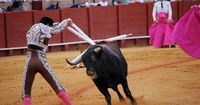MEXICO CITY—On March 17, 2025, the Mexico City Congress marked a significant change in the future of bullfighting by approving a controversial reform that allows bullfighting shows to be conducted without violence. The decision came after a vote of 61 in favor and only 1 against, reflecting a growing trend toward animal rights and welfare.
The reform outlines stringent new regulations aimed at prohibiting injuries and deaths of bulls during these events. Specifically, sharp objects commonly used in traditional bullfights are banned, and the time each bull can perform is reduced to ten minutes. This new framework aims to transform the traditional spectacle into a format deemed more humane.
Raúl Pérez Johnston, president of the Legal Committee of Mexican Bullfighting, voiced strong opposition, arguing that the proposal fundamentally alters the essence of bullfighting. “This proposal distorts bullfighting,” he stated. Pérez emphasized that the proposal would lead to a loss of authenticity, akin to swapping a football for a rugby ball in the sport's essential structure. Meanwhile, Deputy Jesús Sesma from the Green Ecologist Party of Mexico (PVEM), a key supporter of the reform, asserted that this change represents an evolution of bullfighting that acknowledges the need to treat animals humanely.
“We have been mistreating other living beings for entertainment for too long,” Sesma remarked. “I am convinced this will be a landmark moment for the future of Mexico City and the entire country.” This sentiment was echoed by the animal rights organization Humane World for Animals Mexico, which welcomed the reform but cautioned that a 'violence-free' bullfight does not eliminate suffering. As the executive director Anton Aguilar stated, “Every step we take toward the more humane treatment of animals helps us build a more ethical society.”
The approved bill redefines bullfighting in accordance with Article 4 of the Animal Protection Law of Mexico City, requiring that all bull-related activities, including novilladas and rejoneo, occur 'without violence'. Furthermore, it mandates that bulls must be returned to their ranches after events, and any violation of the new rules could result in hefty fines of up to $16,970 for each injured or killed animal.
However, the reform has prompted legitimate concerns about its implications on jobs within the bullfighting sector. Critics argue that the measure undermines the livelihood of those working in the industry and related businesses. Pérez expressed that this change would have a significant negative impact not only on Mexico City but also on the entire international bullfighting industry and its supporting services, including transportation and local restaurants.
As this political debate unfolds, Deputy Sesma reassured concerned parties that the reforms would be implemented progressively to minimize economic disruption. “What we aim for is to be sensitive to society while also considering those who depend on this activity,” he explained. For the bullfighting proponents, the new format could potentially jeopardize the tradition as they know it.
From a practical standpoint, the logistics of implementing such reforms pose additional challenges. Pérez pointed out the complexities involved in transporting bulls for performances and reintegrating them into their herds afterward, indicating potential health risks. “Once a bull has been featured in a fight, reintegration could create issues, and transportation poses its own set of dangers,” he warned.
The broader implications of this law highlight not only changing views within Mexican society towards animal rights but also reflect trends seen globally, as countries like Colombia recently moved to ban bullfighting altogether. With about 180,000 bulls experiencing death annually in bullfighting events worldwide, reform advocates argue that this law marks an essential shift in the cultural landscape.
While the traditionalists aim for compromise allowing for the continuation of the events, the landscape of bullfighting in Mexico City appears to be irrevocably transformed. The ongoing discussions will shape not only the future of this cultural practice but also the growing movement for animal welfare within Mexico.
The momentum for change has been building, especially since a previous suspension of bullfighting in Mexico City in May 2022 was overturned in December 2023 by the Supreme Court. The recent changes, heralded by public sentiment, seem to foreshadow a wider acceptance for humane treatment of animals within entertainment.
As the city prepares for this new chapter in its relationship with bullfighting, the voices of both proponents and opponents will continue to play an essential role in the evolving narrative.


